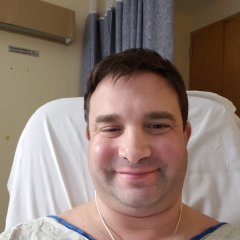Search the Community
Showing results for 'Complications'.
Found 17,501 results
-


October 2018 Sleevers
Leahandthesleeve replied to kdiddle31's topic in Gastric Sleeve Surgery Forums
Hi folks, I had my surgery October 3,2018 it went really well and I came home the next day. I did great til day 4,5 when I started having severe pain and I had to be readmitted to the hospital. I had some spleen complications. I am home again since day 7 and I am feeling super antsy, super itchy in my incisions, and super wishing I could “eat” not drink my food. I am definitely struggling last night and today with “food withdrawal” -


Anyone have an issue progressing their diet
Diane60 replied to Diane60's topic in Gastric Sleeve Surgery Forums
Frustr8, I hear you. I was starting to regret this whole process, I’m praying this procedure will resolve my issue without further complications. I hope things go well for you too. I’ll keep you posted. -


Anyone have an issue progressing their diet
James Marusek replied to Diane60's topic in Gastric Sleeve Surgery Forums
It is a little common for individuals to develop a stricture after weight loss surgery. Generally this condition is treated by endoscopic dilation. Also be aware that some patients will require this procedure a few times. According to the internet: Formation of stricture is another potential complication occurring after LSG [Laparoscopic Sleeve Gastrectomy]. It could present either acutely after surgery due to tissue edema or more commonly in a delayed fashion. Presenting symptoms include food intolerance, dysphagia or nausea and vomiting. Although kinking of the stomach following LSG has been reported, the most common site of stenosis is at the incisura angularis. An upper gastrointestinal study or endoscopy is usually diagnostic. Treatment options depend on the time of presentation. A stricture diagnosed acutely after surgery can sometimes be treated conservatively with bowel rest (nothing by mouth), rehydration with intravenous fluids and close observation. In the absence of other pathologies (e.g., abscess, leak), these strictures will spontaneously resolve with no need for further intervention. Failure of conservative management warrants endoscopic dilation. In contrast, chronic strictures usually require further intervention. These include either endoscopic or surgical treatments. Treatment options depend on the length of stenosis. Endoscopic dilatation is an invaluable tool used in this setting of a short segment stenosis. Successive treatments in 4- to 6-week intervals are adequate to treat stricture and ameliorate patient symptoms. In contrast, long segment stenosis and failure of endoscopic management demands a surgical intervention. Options include laparoscopic or open seromyotomy or conversion to Roux-en-Y gastric bypass. Dapri and colleagues26reported their experience with laparoscopic seromyotomy in patients who had LSG. These investigators reported successful results with this treatment. Parikh and colleagues reported an incidence of 3.5% of symptomatic stenosis following LSG in their series of 230 patients; 2 patients required conversion to a Roux-en-Y gastric bypass owing to failure of endoscopic management. Source: https://www.ncbi.nlm.nih.gov/pmc/articles/PMC3788014/ -
Hi gang. I'm one month post op and thought I'd update on how I'm doing and maybe post a few questions for the hive mind. So, my surgery was September 11. My height is 5'9". My high weight was on day 1 of my pre-op diet. (270), BMI 40. I just food funeraled my brains out. I was 255 on day of surgery. And today I am 229.9. Total lost is 40.1. Current BMI 33.8 I am still on a liquid diet. My surgeon is extremely conservative with diet advancement. So I have 2 protein shakes a day, cream soups with the solids strained out, and water or crystal light. I will remain on this diet until the beginning of November. I take a leisurely 1- 1.5 mile walk about 4-5 times a week. I will be returning to work on Friday. I work 7p-7a as an RN in and ICU, so I am a bit nervous to return. Next week, I will return to the gym once I see if all restriction is lifted and plan to work out 3-4 times a week for 30 minutes to 1 hour combining cardio and weight training. My energy level has gotten gradually better as time goes on. It was brutal the first 2 weeks, hard the third, and this week has been quite a bit better in terms of ability to get things done. I have not had any constipation yet. Nor have I had any other major complications. I take omeprazole, vitamins, and asthma medication. I only had nausea in the hospital and once at home on the 2nd day back. I sip ALL. DAY. LONG. I do burp quite a bit, but not with any discomfort. More of an annoyance that I hope will eventually settle down. The liquid diet only has been the hardest part. When all is said and done, I will have done 9 weeks of no solid food whatsoever, and it has been a real challenge. I have three children at home and I am still preparing meals for my family because my husband has had a huge work project going on and works late a lot and he is also in grad school. I do the majority of the food shopping, preparing and cleaning up and so I am constantly faced with solid food and a desire to taste something, anything! other than a protein shake or those disgusting soups. I actually gag at the thought of those soups. I try to remember that each day that passes is one day closer to resuming eating solid foods again and that I am incredibly lucky to have lost so much weight so rapidly when I started out at a BMI of 40. I'm sure it's in large part due to my conservative diet. I did have one stall in week 3. It lasted 6 days. I dropped one pound and then stayed there another 3 days. That was a downer. Even though I knew it was normal and to be expected and I'd had good weight loss, it is very hard to be so strict and stringent and be consuming only 450 calories a day and stay the same weight for 9 days. It just seems unfair and takes a lot of mental and emotional willpower to just soldier on. Stalls are not cool. Even if they are part of this whole journey. I could do without them, thank you very much. So, here are some questions I have for all you wiser, more seasoned sleevers.... 1) GERD is a fear of mine. I have not had any symptoms of GERD so far. Anyone out there have no GERD symptoms immediately post-op but then develop them down the road? Just want to know if i am in the clear or still need to be on the lookout? 2) Once you advanced your diet and introduced solids, what are your go to rules -- like I always drink at least blank ounces of water between meals. Or I never go more than blank hours without eating. Or whatever. What are your go to habits that work best for you? 3) What are things you wish you wouldn't have done, if anything? 4) What advice would you give to someone at this point of the sleeve journey? Thanks in advance!
-
Hi SleeveGirl88. Having GERD isnt' the same thing as having reflux every once in a while because you ate some food that disagrees with you. When they are discussing GERD as a contraindication for VSG, they are talking about people that have it regularly at least one or two episodes a week that don't necessarily have anything eating greasy food. You also don't seem to have any co-morbidities and a relatively low BMI of 40 (the average bariatric patient has a BMI of 42.5). If you're goal is weight loss, I would probably go with the VSG. While RNY may have slightly better total weight loss numbers and slightly lower regain rates over 5 years, the differences aren't really statistically significant--particularly for someone with your BMI. You'll do great with either the sleeve or the RNY and you're not going to get much of a weight loss advantage going with an RNY. There have been a lot of comparative studies that have been published over the past two years that support this conclusion. In terms of weight regain, some people start to see it earlier in the process with the sleeve but in the limited number of long term studies that track people beyond 5 years--there really isn't a long term statistical difference. What does seem to make a difference your starting BMI. Whether you're a sleeve or an RNY, if you start the journey with a BMI of 40 or less, the chances of you having BMI below 30 after one year is 95% and the chance of you maintaining a BMI under 30 after 5 years is over 75% with either procedure. The numbers for both procedures drop considerable the higher your BMI is at the time of surgery. The other thing to think about, particularly if your young (under 50), is that you're going have to live with this surgery for a long time. While RNY may have slightly better 5 year outcomes on the whole, the differences aren't really statistically significant. For someone like you, it might only mean a 5-8 pound difference (maybe)--but ultimately, it's probably not much of a difference at all. Ten or 15 years post op, you could be at a point where you have had significant regain with either procedure (hopefully not) and then you have think about revision (since obesity is a chronic condition). With this in mind, you should consider which procedure gives you the most and best options for revision. With RNY, you're revision possibilities are currently limited. In some cases, the pouch can be made smaller. Surgeons can also increase the length of the biliopancreatic limb to increase malabsorbtion or convert you to a distal bypass. The weight loss benefits of these procedures are disappointing for the most part, but these procedures can help treat co-morbidities. A more aggressive or radical approach would be to reverse the RNY and switch to a totally different procedure, but this is a very complicated and risky procedure that most bariatric surgeons aren't comfortable performing (at least not in 2018). In truth, your options of revision from and RNY are limited and may not be very effective for weight loss/regain. Options for revision from a sleeve if there is significant weight regain or re-occurrence of co-morbidities are numerous and more effective. Resleeves are common, easily performed and can help get you back on track. Since holds more volume to begin with and the pyloric valve is preserved with a VSG, resleeves seem to be more effective than revisions to a RNY pouch for treating weight regain. A sleeve also can be easily converted to an RNY down the road, but this is usually done to treat severe GERD--not so much for weight loss (although it can be used for this too). The most exiting option with a sleeve is that it can easily be converted to a BPD-DS or modified duodenal switch (also called a loop DS, SIPS, SADI-S), which is still considered an investigational procedure in the United States, but is probably the future of bariatric surgery. This is essentially a VSG with a single long limb bypass that attaches midway down your small intestines (roughly speaking) and has only one anastomosis (one connection point). It gives you most of the benefits of a BPD-DS (which is by far the most power bariatric surgery, but also the most risky), with approximately the same risk factors as an RNY. More studies are needed for the modified DS before it will be widely adopted in the US, but it's being adopted by many surgical centers and long-term RCTs are being done as we write (with excellent short and mid-range results). As a revision from a VSG, the SIPS procedure will be an easy upgrade that will only take about 30-60 minutes and will mostly likely be performed on an outpatient basis in the future (The SIPS bypass is much less complicated and less invasive that the VSG part of the procedure). In the end, both the RNY and VSG are excellent options that are very effective for weight loss. You can't go wrong, with either one. However, if you like and trust your surgeon and if he or she has been gently nudging your towards the sleeve, you should probably take his or her advice.
-
You can do this. My recovery wasn't that bad really. By the 2nd day at home I was doing for others and making dinner for the fam. The first day, I just napped, watched tv with my sissy and Mr. F, and just was lazy--almost the same as having an out-patient simple anesthesia procedure. It honestly was no big deal and "round the clock care" is only necessary IMHO if you have some kind of complication like excessive pain, vomitting, nausea, wooziness, extreme mobility issues...etc. Good luck and so sorry about this, but honestly it's better to know this now pre-surg so you don't have to compound recovery with this mess!!! (Get him out of your house asap...just sayin...)
-
I was sleeved on September 28th and I’m 12 days out and feel great. I took two weeks off from work just in case. I have a desk job and feel as Thai could’ve went back after one week. I did try to do some yard work and tired out really quickly. Only complications I had were from the anesthesia causing nausea and vomiting. So much so that they were gonna try and keep me another day (I wasn’t trying to hear that). I didn’t take any pain medication I was even trying to have them give me narcan cause whatever they gave me from surgery was knocking me out.
-


Self Payers in Florida
Jimmy Keller replied to purpleapple's topic in Weight Loss Surgeons & Hospitals
anyone on here use Dr Brett Choen at memorial?My surgery date is November 19th.It is 17500 with one night stay and bliss ins for 90 days for complications. -


Is it possible to build muscle after the sleeve? I'm about to find out.
greenlitego70 replied to BlueCrush's topic in Fitness & Exercise
I am very interested. I had complications from the sleeve. I was already down to 165lbs and had to have a revision to bypass. There were more complications and I was in the hospital for 3 weeks, two of which were NPO before they put me on TPN. I lost another 20lbs, but a ton of muscle mass. Being a bypass patient it’s hard getting enough calories to support working out. I’m dying to see what advice if any you can offer. -


Should I switch to RNY?
CrankyMagpie replied to sleevegirl88's topic in Gastric Sleeve Surgery Forums
RNY-to-sleeve revisions happen, but it's apparently mostly because of severe reactive hypoglycemia and other really weirdly specific complications. Sleeve-to-RNY is more common in part because the sleeve was eventually conceived as a safer surgery to give people with much higher BMIs, with the intention of converting them to RNY once they lost enough weight that that was a safe option for them. They started doing it as a standalone procedure when many of those patients opted not to come in for the second surgery, being successful with just the sleeve. But sleeve-to-RNY absolutely does happen, still, especially for people who have uncontrolled GERD or who can't lose enough weight with the sleeve alone. In my pre-op testing they found some small lesions in my esophagus, which might have been esophagitis or might have been a small amount of GERD. I went with the sleeve despite that, because I also have arthritis and might need to take ibuprofen and other NSAIDs again, ever, in my life. (Also, I had been taking large amounts of NSAIDs over a long period of time, and they may have been responsible for some of the damage they found.) I can't tell you how that turned out for me, since I'm only a week post-op, but I will say my doctor didn't try to sway me toward RNY at all, and given that I also had a hernia repaired, I'm pretty hopeful that it'll all turn out OK. -
To be fair Matt, it’s 6 of one and half a dozen of the other. Neither is reversible. They become variations of each other when you make the switch to/from. I'm sorry, but the Bypass **IS** reversible. It doesn't happen often, but it certainly does happen. There has been, at least 1 member here in the last, month or so that was approved for RNY reversal. And to be clear, I am fully aware of the process for revisions. I'm specifically stating, that the bypass *CAN* be reversed, under special circumstances, that *HAVE* happened to at least 1 member of this site within the last month or so, whereas the sleeve *CANNOT* be reversed, under any circumstances. And a quick google for "RNY Reversal" https://www.ncbi.nlm.nih.gov/pmc/articles/PMC4196428/ https://www.soard.org/article/S1550-7289(14)00472-9/abstract Conclusions Reversal of RYGB to normal anatomy is reasonable in patients with severe or refractory complications.
-
SIPS is a less invasive procedure, therefore *should* result in fewer surgery complications and fewer long term side effect, while delivery the same results as full DS. Sounds really good on paper, right? But it's new, so there's not as much evidence to support it. For those who believe, Full DS is an outdated procedure and you should count yourself lucky to have the modern technique. For those that don't, you're a guinea pig.
-
I had the SIPS procedure (a.k.a.single-anastomosis duodenal switch), which is the new kid on the block. Similar to DS, but a simpler procedure which - in theory - means less risk of complications, and fewer side effects. For instance, because the channel is in the 250-300cm range, there are fewer vitamin deficiency issues than traditional DS. Quote: Patients report experiencing significantly less malabsorptive symptoms compared to a standard duodenal switch because the common channel length is almost twice that of a standard DS. But as noted in my earlier post, there are people on forums who will say SIPS is still "experimental" or at the very least, has not been around long enough to support the above claims. The single-anastomosis duodenal switch, also called stomach intestinal pylorus sparing surgery (SIPS), or the single loop DS, is very similar to the standard duodenal switchoperation, except that the small intestine is only transected at one point instead of two. With this operation, the majority of the most stretchable portion of the stomach is permanently removed (as in a sleeve gastrectomy) but basic stomach function remains the same. In addition, roughly half of the upper small intestine is bypassed, resulting in a moderate decrease in calorie absorption. Weight loss is achieved both through restriction of food consumption and malabsorption, which results in very good long-term weight loss maintenance. http://www.centerforweightlosssurgery.com/service/weight-loss-surgery/single-anastomosis-duodenal-switch
-
I am having bypass on the 1st. I can only take 2 weeks because I live alone and that's all the paid leave I have. My boss had bypass and started going to meetings (not a full day of work) 3 days after he got out of the hospital. I did apply for FMLA in case something goes awry and I can't get back to work within 2 weeks... but financially... I will be screwed. Everyone at my doc has said 2 weeks should be fine since I have a desk job, barring any complications. The longest they said anyone has ever taken was 4 weeks, and it wasn't because of pain, but just getting used to the foods.
-


4 Weeks Post Op and just NOW having problems
James Marusek replied to Arandomme's topic in POST-Operation Weight Loss Surgery Q&A
According to the internet: A stricture is when the opening to or from the stomach becomes inflamed and/or blocked preventing all or some of the food from properly entering the stomach or intestines. Strictures can be either acute or chronic (very quick onset or an ongoing issue after surgery). What to look for? Nausea or vomiting. Difficulty swallowing. Food intolerance. When to call your doctor? As always call your doctor if you think something is wrong. If nausea and vomitted is present every time you eat, or you are having difficulty swallowing, contact your doctor immediately. How common is a stricture? According to this study, strictures were present in about 3.5% of patients after surgery. However, while a stricture can be serious, often they are treated with a simple endoscopic dilation (inserting a camera down your throat under anesthesia to widen the stricture). How are they treated? If the stricture is diagnosed shortly after surgery, it can usually be treated with rest, nothing by mouth, and intravenous fluids. If the stricture is diagnosed a few weeks or more after surgery then the treatment will depend on the length of the stricture. For short stenosis (narrowing of the stomach) the physician will typically perform an endoscopic dilatation. Multiple treatments every 4 to 6 weeks will typically clear the stricture. For longer stenosis, the phsyician may have to intervene surgically and convert the patient to gastric bypass. Source: https://www.obesitycoverage.com/uncomplicating-gastric-sleeve-complications/ Your body needs time to heal, so there is no reason to accelerate the transitions between liquid/puree/ solid food stage. Just take your time with these transitions. -


My surgery date is coming
beingdina replied to CRD1981's topic in PRE-Operation Weight Loss Surgery Q&A
I was sleeved 9/25 and doing fairly well. Believe after some soup that made my sleeve angry it caused some reflux so I’m behind in liquids and protein but starting to try to catch up after a couple days of TLC. Still makes me nervous anytime I feel anything because I’m sure it’s one of the horrible complications. Down 16.4 since surgery and 49.7 since I started my pre-op on 8/28. I miss eating but after the soup experience I’m fine holding off for another couple of weeks. -


Surgery in the morning...Nerves are kicking in!
Twism44 posted a topic in Gastric Bypass Surgery Forums
Need to be at the hospital at 530A. Surgery is at 730A. Nervous about anesthesia, procedure complications, post-op pain...pretty much everything. Leaving it in God's hands. I praying that I'll be ok. -


Intermittent Fasting Daily Menu/Results/Accountability
FluffyChix replied to FluffyChix's topic in Post-op Diets and Questions
Oh wow! Ok, so yeah, the shakes lessening are good! But sadly the granola is probably one of the culprits of that. Are you making the granola homemade? Or are you using pre-made stuff? Cuz I can link you to some homemade low carb ones that are easy to make! And taste fabulous. Yay on watching the vid and getting the book. I just started reading it yesterday. So far I've just been trying to devour his YouTubes and building on my IF stuff from my books from Dr. Johnson, Dr. Moseley, and Dr. Varady on ADF IF. These 3 espouse the ADF calorie restricted methodology rather than meal timing IF. But as usual...I complicate and do both. I think Dr. Fung may be in favor of the longer IF OMAD version and look forward to reading his recs for dietary protocol. If by sweetener you mean anything with sugar or fructose or sucrose, then most definitely. Anything with highly available carbs will spike insulin -- even grains and legumes (although certain grains spike it slightly slower). Do you have Stevia or Swerve or Truvia or Sukrin products there? Those that have stevia and fructooligosaccharides stimulate it less. There is some info that Splenda (sucralose) spikes insulin, and the vote is split on whether or not erythritol spikes insulin--on the sucralose and erythritol, these insulin spikes occurred in the absence of blood sugar spikes--so they are silent offenders. But bottom line is if insulin is elevated, fats stores get locked up tight in the cells and won't be released. I think 14/10 and 16/8 are def. great places to start. I can't wait to read more about the protein requirements during IF, cuz I am concerned with getting my protein in on days that I do 22-24hour fasts like I'm doing today. The most I can get in right now is about 50g of protein. Congratulations to her!!! BTW, even though you are normal weight you can also IF 1-2 days per week. You just have to make sure to balance your cals on non-fasting days with healthy cals and you might be able to take advantage of the autophagy that it offers for eating loose skin and damaged cells!! -


Is rny good for BMI 36/37 with high blood pressure
harmony love posted a topic in PRE-Operation Weight Loss Surgery Q&A
Hello everyone, First I want to let everyone know that Im super thankful for each of your post. So much of you guys pretty much have helped me prepare for whats coming up soon whether its sleeve or bypass. In a nutshell Im 40yrs old with BMI 36/37 with high blood pressure and cholesterol issues. My dad passed away at 43 from massive heart attack and been overweight all my life but recently had twins which through my body off even more. I've done so much research about both surgeries and feel bypass even though more complicated, I feel its long term effects is what I need, even though I know people who has had sleeve with diet also achieve long term effects. I also had battled heartburn and I'd rather take multiple vitamins the rest of my life and go through dumping syndrome than having GERD. I originally discussed having sleeve on my initial visit but now having second thoughts. My last appointment is this week with my surgeon before booking surgery assuming insurance approves I'm at the end of this pre-op visits. I just like to know that I'm not crazy for wanting a bypass. -


I'm going crazy deciding which surgery to choose!
harmony love replied to Shimmy's topic in PRE-Operation Weight Loss Surgery Q&A
Hi everyone Its my first post and would like to let everyone know how appreciative I am that this community is out there. Im writing also because I'm conflicted on which surgery is best for me and I know its ultimately my surgeon and my decision but still very scared. Just a little history of me I'm a working mom of almost 3 year old twins, I work at a fast pace medical office so Im pretty much on my feet 8-12 hours a day. I've been overweight all my life but since my pregnancy I have not been able to loose weight and have high blood pressure with high cholesterol levels. My father had passed away from a massive heart attack at 43 yrs old and I just turned 40. My BMI is between 36-37. My first initial visit 6 months ago was to get gastric sleeve but since I've been feeling in my heart I want bypass. On my endoscopy it shown some inflammation due to acid reflux and I've suffered most of my pregnancy with it and definitely do not want GERD. I know theres more vitamin deficiencies and more complications but I feel like theres more long term benefits with bypass. Again I really can't thank you all Ive been reading most of your posts and I feel so much more informed then I was when I started this journey. BTW my pre-op appointment with my surgeon is this week and Im a ball of nerves -


Intermittent Fasting Daily Menu/Results/Accountability
FluffyChix replied to FluffyChix's topic in Post-op Diets and Questions
Ok so I'm oncell right now and will answer more tomorrow. It's more complicated for her. 🙁 U should buy his book the complete book of fasting. I'm reading it now. -


Intermittent Fasting Daily Menu/Results/Accountability
FluffyChix replied to FluffyChix's topic in Post-op Diets and Questions
Hiya!!! You inspire me so much girlie!!! Congrats on the 135lbs. Def vote that the weight uptick is the salt in the chili/lime cashews but man do they sound delightful!!! Yum! Love your new obsessions! We go thrifting almost every Saturday. I feel such satisfaction to walk out with regular size clothes for $1-$3!! Ha!!! Love your developing bits. Is it very hard working with a trainer? I seriously could not take the Biggest Loser trainer screaming crap. Stressful! Dinner sounds good! LOL your shake sounds complicated. Why is it nasty? JAPB. LOL. If you hate the taste of your shake your clearly are NOT adding enough peanut butter. Ha! I heart my Vitacost Peanut Butter Slim. For only 4g of the powder by weight, it masks a miriad of shake sins. Welcome Biddy's Wife!!! Woot!!! And congrats on your 10lb loss so far. That's OUTSTANDING! You can totally do 3-5lbs more with IF and probably more. Hope you'll come hang here with us--both of yas!! Yeah...make your own low carb muslei if you absolutely must eat late at night. But try to only have decaf coffee or decaf tea plain no sweetener or milk/cream. Here's a YouTube explaining more on IF by Dr. Fung that I just saw yesterday. Fascinating stuff! Gosh I hope the science on this doesn't turn out to be bogus cuz it sure sounds miraculous!!! Therapeutic Fasting on YouTube by Dr. Jason Fung -


I'm going crazy deciding which surgery to choose!
Matt Z replied to Shimmy's topic in PRE-Operation Weight Loss Surgery Q&A
Everyone is going to have a different experience. But looking at the "averages", it seems a decent number of people develop GERD from the sleeve. And quite a few people don't get any dumping at all. I've had exactly 1 incident of dumping, in over 6 months. And that was with tomato soup. I can eat pretty much anything I want at this point with zero dumping. I do get crampy here and there if I eat something I know I shouldn't, but I don't have any issues with any sweeteners. I went with the band back in 2011... and was revised to RNY this past March. Honestly the best thing I've done. I have a friend that was sleeved and he also had to get revised to the bypass due to complication with the sleeve. Also, the sleeve is 100% non-reversible. The Bypass is reversible under certain conditions, it's a risky reversal, but it does happen, you cannot undo the sleeve since 90% of your stomach ends up in the trash. Also, long term research keeps showing that the bypass out performs the sleeve in all metrics. Patients lose more, keep it off longer, have lower rebounding weight gain. It is 100% your decision, but my 2 cents, go with the bypass. -


Eating after RNY compared to eating after a band
NJH replied to elcee's topic in Gastric Bypass Surgery Forums
ELcee, Same here. 14 years with a lap band. Had it removed because of complications and wasn't working. At the same time, did a gastric bypass. 4 weeks post-op now (17 lbs lost), and loving the gastric bypass. NEVER hungry. Ever. With the lapband, I was. I do experience occasional vomiting, like the lapband, and I believe that it's because I'm just getting adjusted to my limitations and eating patterns. I encourage you to have the bypass. I'm glad I did. NJH -
I was wondering if anyone had any experience with a gastric ulcer post op? I’m three and a half weeks post op VSG and I’ve had really bad nausea starting this past Saturday. I was also unable to keep much of anything down. Finally got in to see my surgeon yesterday and also had a barium swallow test, blood test, And B1 injection. The barium swallow test showed that everything is fine structurally, but they did suspect a gastric ulcer. My surgeon made a call and got me into a gastroenterologist office to have an H. Pylori test. That came back negative, so we are treating like it is an ulcer. Back on carafate and two different PPIs. The NP called today to tell me my labs looked normal but they I’m going to need to go back to full liquids while this heals, which could be 4-5 weeks. That was really disheartening to hear because full liquids was really difficult for me and I’m just a few days from eating a “semi-normal” diet. Just to clarify, this isn’t necessarily a complication from the VSG, I understand that. I could have developed it regardless... just wanted to see if anyone else has gone through it.











